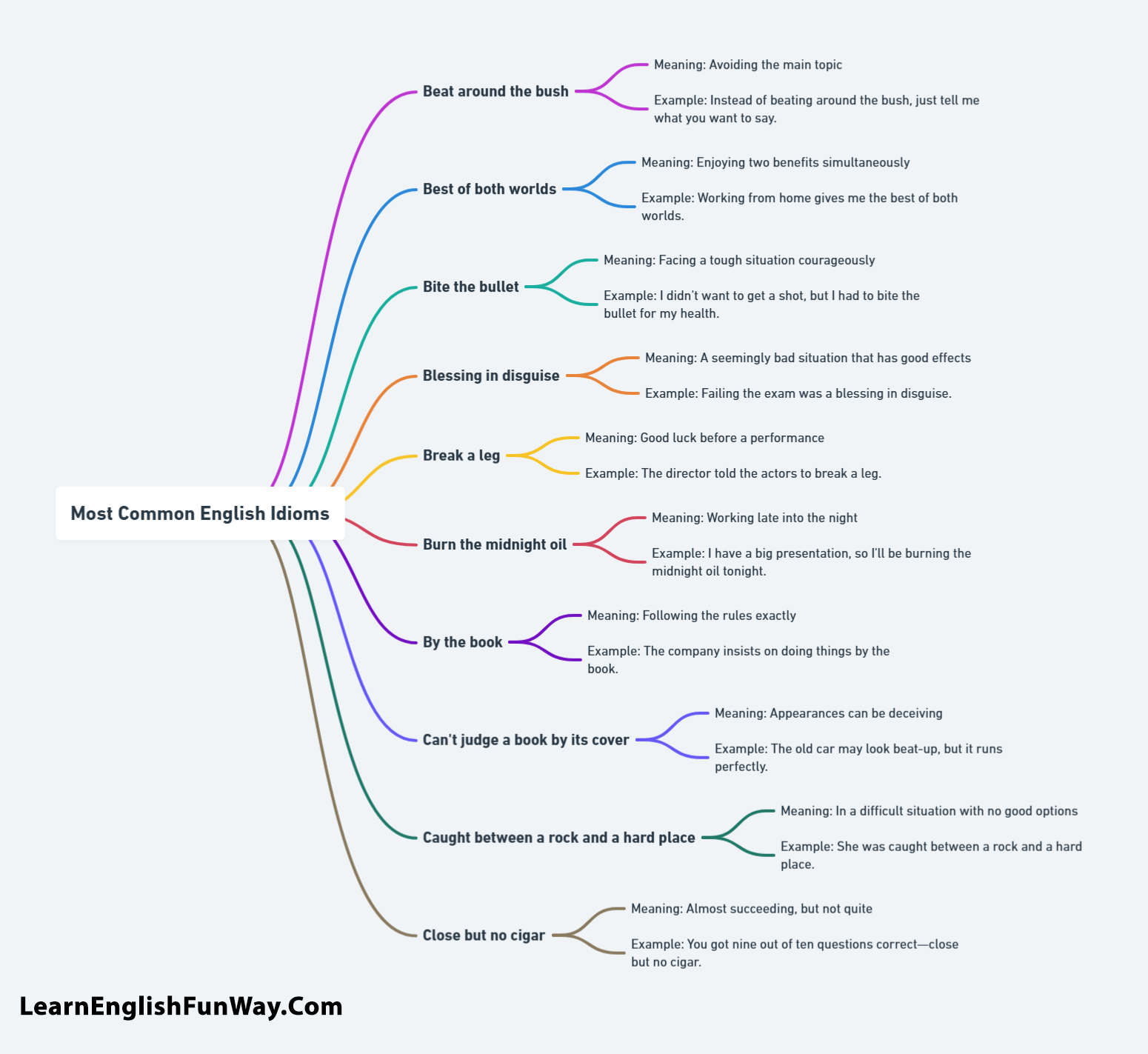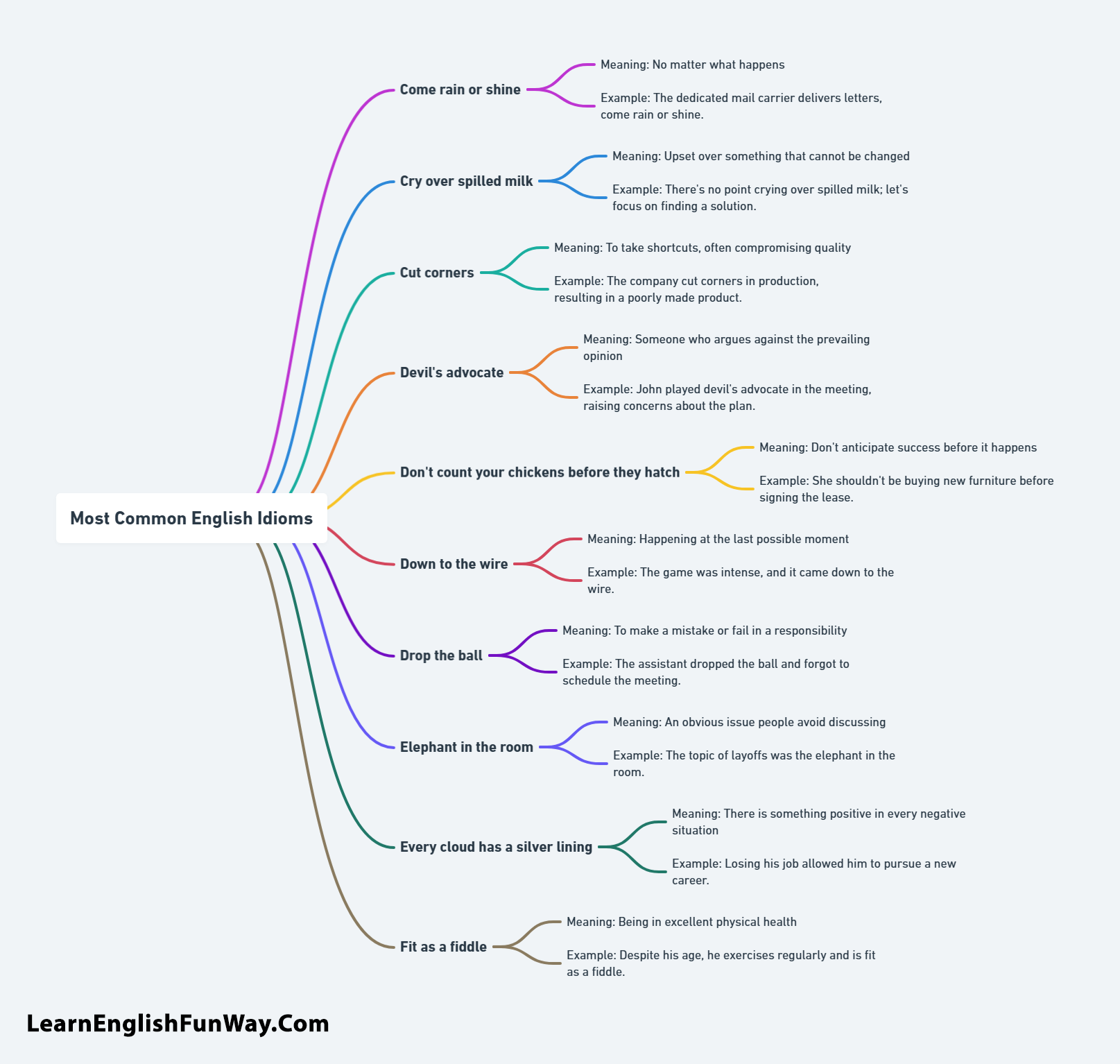The English language is full of interesting sayings and phrases that may sound strange if you take them literally. These expressions, called idioms, have hidden meanings that native speakers easily understand. Whether you’re a language lover, a student, or someone learning English, knowing these idioms is important for becoming fluent. In this article, we will explore the 100 most common English idioms and phrases, explaining what they mean and giving examples to help you understand them better. So, let’s start exploring these common expressions that are used in everyday English conversations.

Table of Contents
100 Most Common English Idioms And Phrases:
1. Break the ice
Meaning: To get the conversation going or to initiate a social interaction.
Example: I decided to break the ice at the party by asking about everyone’s favorite movies.
2. A dime a dozen
Meaning: Very common or easily found; abundant and not valuable.
Example: Those generic souvenirs are a dime a dozen at every tourist shop.
3. A piece of cake
Meaning: Something that is very easy to do.
Example: After studying for weeks, the final exam felt like a piece of cake.
4. Actions speak louder than words
Meaning: What a person does is more important than what they say.
Example: He keeps promising to help, but actions speak louder than words.
5. All ears
Meaning: Fully listening or paying complete attention.
Example: I’m all ears, go ahead and tell me your exciting news!
6. All in the same boat
Meaning: In the same situation or facing the same challenge.
Example: We’re all in the same boat, dealing with the aftermath of the storm.
7. An arm and a leg
Meaning: To be very expensive or cost a significant amount.
Example: The price of that luxury handbag is outrageous; it’ll cost you an arm and a leg.
8. At the drop of a hat
Meaning: Instantly or without any hesitation.
Example: She’s always ready to go on a road trip; she’ll pack her bags at the drop of a hat.
9. Back to the drawing board
Meaning: Starting over again from the beginning because the previous attempt was unsuccessful.
Example: The prototype didn’t work as expected, so we’ll have to go back to the drawing board.
10. Barking up the wrong tree
Meaning: Accusing or directing efforts toward the wrong person or thing.
Example: If you think I ate your cookies, you’re barking up the wrong tree; it was your brother!
11. Beat around the bush
Meaning: Avoiding the main topic or not getting to the point in a conversation.
Example: Instead of beating around the bush, just tell me what you want to say.
12. Best of both worlds
Meaning: Enjoying the benefits of two different things at the same time.
Example: Working from home gives me the best of both worlds: I can spend time with my family and still do my job.
13. Bite the bullet
Meaning: To face a difficult or unpleasant situation with courage and determination.
Example: I didn’t want to get a shot, but I had to bite the bullet for my health.
14. Blessing in disguise
Meaning: Something that seems unfortunate but turns out to have positive effects in the long run.
Example: Failing the exam was a blessing in disguise because it motivated me to study harder.
15. Break a leg
Meaning: Good luck, especially before a performance or important event.
Example: Before going on stage, the director told the actors to break a leg.
16. Burn the midnight oil
Meaning: To work or study late into the night.
Example: I have a big presentation tomorrow, so I’ll be burning the midnight oil tonight – or I’ll get smart and use an essay writing service like SameDayPapers (https://samedaypapers.com/) to save time
17. By the book
Meaning: Following the rules or guidelines precisely.
Example: The company insists on doing things by the book to maintain professionalism.
18. Can’t judge a book by its cover
Meaning: You can’t determine the value or character of someone or something just by appearance.
Example: The old car may look beat-up, but you can’t judge a book by its cover—it runs perfectly.
19. Caught between a rock and a hard place
Meaning: Being in a difficult situation where there are no good options.
Example: She was caught between a rock and a hard place: stay in a toxic job or risk unemployment.
20. Close but no cigar
Meaning: Almost succeeding but not quite achieving the desired result.
Example: You got nine out of ten questions correct—close but no cigar.
21. Come rain or shine
Meaning: No matter what happens or what the circumstances are.
Example: The dedicated mail carrier delivers letters, come rain or shine.
22. Cry over spilled milk
Meaning: To worry or be upset about something that has already happened and cannot be changed.
Example: There’s no point crying over spilled milk; let’s focus on finding a solution.
23. Cut corners
Meaning: To do something quickly or take shortcuts, often compromising quality or standards.
Example: The company cut corners in production, resulting in a poorly made product.
24. Devil’s advocate
Meaning: Someone who presents a counter-argument or challenges prevailing opinions to provoke critical thinking.
Example: John played devil’s advocate in the meeting, raising concerns about the proposed plan.
25. Don’t count your chickens before they hatch
Meaning: Don’t make plans or anticipate success before it happens.
Example: She shouldn’t be buying new furniture before she’s signed the lease; don’t count your chickens before they hatch.
26. Down to the wire
Meaning: Happening or being decided at the last possible moment.
Example: The game was intense, and it came down to the wire with a last-minute goal.
27. Drop the ball
Meaning: To make a mistake or fail to fulfill a responsibility.
Example: The assistant dropped the ball and forgot to schedule the important meeting.
28. Elephant in the room
Meaning: An obvious problem or controversial issue that people avoid discussing.
Example: The topic of layoffs was the elephant in the room during the staff meeting.
29. Every cloud has a silver lining
Meaning: There is something positive or beneficial in every negative situation.
Example: Although he lost his job, every cloud has a silver lining, and it allowed him to pursue a new career path.
30. Fit as a fiddle
Meaning: Being in excellent physical health or condition.
Example: Despite his age, he exercises regularly and is fit as a fiddle.
31. Get a taste of your own medicine
Meaning: To experience the same negative treatment that one has given to others.
Example: After teasing his brother for years, he finally got a taste of his own medicine when his friends played a prank on him.
32. Get cold feet
Meaning: To become hesitant or fearful about doing something previously planned.
Example: She got cold feet about the bungee jumping adventure and decided not to go.
33. Give the benefit of the doubt
Meaning: To believe someone’s statement or excuse without being too skeptical.
Example: Although he arrived late, we gave him the benefit of the doubt and assumed there was a valid reason.
34. Hit the nail on the head
Meaning: To precisely or accurately identify or describe something.
Example: He hit the nail on the head with his analysis of the current economic situation.
35. In the heat of the moment
Meaning: Acting impulsively or irrationally due to strong emotions.
Example: In the heat of the moment, she said things she didn’t mean and later regretted it.
36. Jump on the bandwagon
Meaning: To join or support a trend or popular opinion.
Example: Many companies jumped on the bandwagon and started producing eco-friendly products.
37. Keep your chin up
Meaning: To remain optimistic or positive in difficult circumstances.
Example: Even though things are tough right now, keep your chin up; it will get better.
38. Kill two birds with one stone
Meaning: To accomplish two tasks or goals with a single action.
Example: By jogging to work, she kills two birds with one stone: exercise and commuting.
39. Let the cat out of the bag
Meaning: To reveal a secret or confidential information.
Example: He accidentally let the cat out of the bag about the surprise party.
40. Miss the boat
Meaning: To miss an opportunity or fail to take advantage of something.
Example: I didn’t submit my application in time, so I missed the boat for the scholarship.
41. On cloud nine
Meaning: Feeling extremely happy or euphoric.
Example: After receiving the promotion, she was on cloud nine for the rest of the week.
42. Play it by ear
Meaning: To handle a situation spontaneously without a definite plan.
Example: We don’t have a set agenda, so let’s just play it by ear and see how the day unfolds.
43. Put all your eggs in one basket
Meaning: To invest all your resources or efforts in a single plan or opportunity, risking everything.
Example: It’s not wise to put all your eggs in one basket; diversify your investments.
44. Rain on someone’s parade
Meaning: To spoil someone’s plans or celebrations.
Example: He always finds a way to rain on my parade and criticize my achievements.
45. Rule of thumb
Meaning: A general principle or guideline based on experience or common sense.
Example: As a rule of thumb, I always double-check my work before submitting it.
46. See eye to eye
Meaning: To agree with someone or have the same opinion.
Example: We don’t always see eye to eye, but we respect each other’s viewpoints.
47. Shoot yourself in the foot
Meaning: To do or say something that harms your own interests or causes a setback.
Example: By quitting his job without a backup plan, he shot himself in the foot financially.
48. Skeletons in the closet
Meaning: Secrets or embarrassing or hidden aspects of someone’s past.
Example: Everyone has skeletons in their closet; it’s best to focus on the present.
49. Spill the beans
Meaning: To reveal or disclose secret information or plans.
Example: She couldn’t contain her excitement and spilled the beans about the surprise party.
50. Steal someone’s thunder
Meaning: To take credit for someone else’s idea or overshadow their achievements.
Example: He presented my idea as his own and stole my thunder during the meeting.
51. Take a rain check
Meaning: To decline an invitation or offer but suggest doing it at a later time.
Example: I’m too busy tonight, but can I take a rain check and have dinner with you next week?
52. The ball is in your court
Meaning: It is someone else’s turn or responsibility to take action or make a decision.
Example: I’ve made my proposal; now the ball is in your court to consider it.
53. The best of both worlds
Meaning: Enjoying the advantages or benefits of two different things at the same time.
Example: Living in a vibrant city with easy access to nature gives me the best of both worlds.
54. The devil is in the details
Meaning: Small or hidden problems or complications that can arise if careful attention is not paid.
Example: The design looks great, but remember, the devil is in the details, so review it thoroughly.
55. Throw in the towel
Meaning: To give up or surrender, often after experiencing defeat or frustration.
Example: After struggling for years, he finally decided to throw in the towel and close his business.
56. Turn a blind eye
Meaning: To pretend not to notice or ignore something, usually something wrong or inappropriate.
Example: The teacher turned a blind eye to the students’ whispering during the test.
57. Up in the air
Meaning: Uncertain or undecided; not yet determined or resolved.
Example: The date for the event is up in the air; we haven’t finalized it yet.
58. Wear your heart on your sleeve
Meaning: To openly and visibly show one’s emotions or feelings.
Example: He wears his heart on his sleeve and is not afraid to express his love and affection.
59. When pigs fly
Meaning: Something that is highly unlikely or improbable to happen.
Example: Sure, I’ll go skydiving when pigs fly!
60. You can’t have your cake and eat it too
Meaning: You can’t have or enjoy the benefits of two conflicting things at the same time.
Example: If you want to save money, you can’t go on lavish vacations; you can’t have your cake and eat it too.
61. A piece of cake
Meaning: Something that is very easy to do or accomplish.
Example: With her expertise, fixing the computer issue was a piece of cake for her.
62. All ears
Meaning: Listening attentively or eagerly.
Example: Go ahead, I’m all ears. Tell me your ideas.
63. Barking up the wrong tree
Meaning: Accusing or pursuing the wrong person or course of action.
Example: If you think I’m the one who ate your lunch, you’re barking up the wrong tree.
64. Better late than never
Meaning: It’s better to do or arrive late than to not do or arrive at all.
Example: He finally apologized for his behavior, saying, “Better late than never.”
65. Bite the bullet
Meaning: To face a difficult or unpleasant situation with courage and determination.
Example: She knew she had to bite the bullet and confront her fears to overcome them.
66. Break a sweat
Meaning: To put in effort or work hard to accomplish something.
Example: If you want to achieve your fitness goals, you’ll have to break a sweat during your workouts.
67. Cut to the chase
Meaning: To get to the point or skip unnecessary details.
Example: Let’s cut to the chase and discuss the main issue we’re facing.
68. Fish out of water
Meaning: Feeling uncomfortable or out of place in a particular situation or environment.
Example: As an introvert at a loud party, I often feel like a fish out of water.
69. Hit the jackpot
Meaning: To achieve a great success or win a large prize.
Example: She hit the jackpot with her latest business venture and became a millionaire.
70. In hot water
Meaning: In trouble or facing difficulties.
Example: He found himself in hot water after missing the important deadline.
71. Keep your fingers crossed
Meaning: To hope for a positive outcome or good luck.
Example: I have a job interview tomorrow; keep your fingers crossed for me.
72. Let the cat out of the bag
Meaning: To reveal a secret or disclose information that was meant to be kept hidden.
Example: She accidentally let the cat out of the bag about the surprise party.
73. Off the hook
Meaning: Freed from a responsibility, obligation, or punishment.
Example: He was relieved to be let off the hook and not face any consequences for his mistake.
74. Piece of mind
Meaning: A state of calmness, tranquility, or relief from worry.
Example: After resolving the issue, he finally had peace of mind.
75. Put someone on the spot
Meaning: To place someone in a difficult or uncomfortable position, often by asking a direct question.
Example: The interviewer put her on the spot by asking about her weaknesses.
76. Quick as a flash
Meaning: Very fast or quickly.
Example: He solved the puzzle quick as a flash; he’s really good at it.
77. Right as rain
Meaning: Completely correct or in perfect condition.
Example: After the repair, the car was running right as rain.
78. Saved by the bell
Meaning: Rescued or saved from a difficult situation at the last moment.
Example: He was about to lose the game, but he scored the winning goal just in time, saved by the bell.
79. The early bird catches the worm
Meaning: Being proactive or taking action early leads to success.
Example: She always arrives early to work and believes that the early bird catches the worm.
80. When in Rome, do as the Romans do
Meaning: Follow the customs, practices, or traditions of a particular place or group.
Example: While traveling abroad, it’s best to adapt to the local culture—when in Rome, do as the Romans do.
81. A bird in the hand is worth two in the bush
Meaning: It’s better to hold onto something you already have rather than risk losing it by trying to attain something better.
Example: I was considering changing jobs, but I decided to stay with my current company because a bird in the hand is worth two in the bush.
82. Actions speak louder than words
Meaning: What someone does carries more weight or significance than what they say.
Example: He keeps promising to help, but actions speak louder than words, and he hasn’t shown up yet.
83. Back to the drawing board
Meaning: To start again from the beginning because a previous attempt or plan failed.
Example: Our marketing campaign didn’t generate the desired results, so it’s back to the drawing board.
84. Cry over spilled milk
Meaning: To dwell on past misfortunes or mistakes that cannot be undone.
Example: Yes, we made a mistake, but there’s no use crying over spilled milk. Let’s focus on finding a solution.
85. Don’t count your chickens before they hatch
Meaning: Don’t make assumptions or be overly confident about the outcome of something before it happens.
Example: I know you’re excited about the job offer, but don’t count your chickens before they hatch. Wait for the official confirmation.
86. Every cloud has a silver lining
Meaning: There is something positive or beneficial to be found in every negative situation.
Example: Losing my job was difficult, but every cloud has a silver lining—I had more time to pursue my passion.
87. Give someone the benefit of the doubt
Meaning: To believe someone’s statement or excuse without being overly skeptical or suspicious.
Example: I’m not sure if his reasons are genuine, but I’ll give him the benefit of the doubt for now.
88. Hit the ground running
Meaning: To start a project or job with great energy and enthusiasm, and with minimal preparation.
Example: The new employee hit the ground running and quickly adapted to the fast-paced work environment.
89. It takes two to tango
Meaning: A situation typically involves two people who are both responsible for the outcome or consequences.
Example: They had an argument, but it takes two to tango, so they both share the responsibility for the disagreement.
90. Kill time
Meaning: To do something to occupy or pass the time while waiting for something else.
Example: I arrived early for the meeting, so I killed time by reading a book.
91. Leave no stone unturned
Meaning: To make every possible effort or search thoroughly in order to find or achieve something.
Example: We’ll leave no stone unturned in our investigation to find the missing documents.
92. Make a mountain out of a molehill
Meaning: To exaggerate or overreact to a minor or insignificant issue, making it seem much more serious or important.
Example: She tends to make a mountain out of a molehill and blow things out of proportion.
93. No pain, no gain
Meaning: Effort or sacrifice is necessary in order to achieve something worthwhile.
Example: If you want to become a skilled musician, you must practice diligently—no pain, no gain.
94. On thin ice
Meaning: In a precarious or risky situation, where one’s actions could have serious consequences.
Example: After his third warning at work, he knew he was on thin ice and had to improve his performance.
95. Play devil’s advocate
Meaning: To argue against or challenge a prevailing opinion or belief for the sake of debate or to consider alternative perspectives.
Example: He enjoys playing devil’s advocate during discussions to encourage critical thinking and explore different viewpoints.
96. Rome wasn’t built in a day
Meaning: It takes time and effort to achieve great things; complex tasks require patience and persistence.
Example: Learning a new language is a process—remember, Rome wasn’t built in a day.
97. Save for a rainy day
Meaning: To save money or resources for future needs or unexpected emergencies.
Example: I always put a portion of my income aside to save for a rainy day.
98. The elephant in the room
Meaning: An obvious or sensitive issue that everyone is aware of but avoids discussing.
Example: The financial problems of the company were the elephant in the room during the meeting.
99. Turn over a new leaf
Meaning: To make a fresh start or change one’s behavior or habits for the better.
Example: After his recovery, he decided to turn over a new leaf and live a healthier lifestyle.
100. When it rains, it pours
Meaning: When things go wrong, they tend to go wrong in rapid succession.
Example: First, I lost my keys, then I got caught in the rain without an umbrella—when it rains, it pours.
Conclusion:
Mastering the 100 most common English idioms and phrases is like unlocking a hidden treasure trove of language. By familiarizing yourself with these expressions, you can enhance your communication skills, better understand native speakers, and even add a touch of flair to your own conversations. Remember, idioms are not meant to be taken literally, but rather to convey deeper meanings that have become ingrained in the English language. So, keep practicing and incorporating these idioms into your everyday speech, and soon you’ll find yourself effortlessly using them like a native speaker. Embrace the richness and versatility of these idiomatic expressions, and let them become an integral part of your English language journey. Happy idiomatic adventures!














